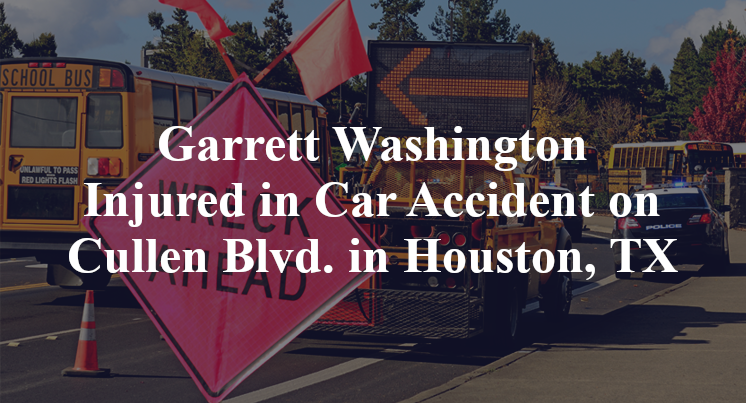Garrett Washington Injured in Car Accident on Cullen Blvd. in Houston, TX
Harris County, TX — July 21, 2024, Garrett Washington was injured due to a car accident shortly before 12:45 a.m. along Cullen Boulevard.
According to authorities, 51-year-old Garrett Washington was traveling in a southbound Pontiac Grand Prix on Cullen Boulevard at the Wenda Street intersection when the accident took place.

Officials indicate that, for as yet unknown reasons, a westbound Acura entered the intersection at an apparently unsafe time, failing to yield the right-of-way at a stop sign. A collision consequently occurred between the front-end of the Pontiac and the back-left quarter of the Acura.
Washington reportedly sustained serious injuries over the course of the accident. He was transported to a local medical facility by EMS in order to receive necessary treatment. Additional details pertaining to this incident are not available at this point in time.
Commentary by Attorney Michael Grossman
Crashes that happen just after midnight often raise questions about visibility, attention, and timing—but when someone ends up seriously hurt, the focus should shift from assumptions to facts. Especially at stop-sign-controlled intersections, there’s a real need to ask whether the crash was truly avoidable—and if all the right steps have been taken to find out.
Did the authorities thoroughly investigate the crash?
At a minimum, investigators should have reviewed vehicle positions, sight lines, and potential lighting conditions at the time of the crash. The key question here is: how far was the Pontiac from the intersection when the Acura began its turn? Without that information—along with speed estimates and any evidence of braking—it's hard to say whether either driver had a meaningful chance to avoid the impact. If the scene wasn't mapped out with precision, those details may still be missing.
Has anyone looked into the possibility that a vehicle defect caused the crash?
If the Acura pulled into traffic at the wrong time, the default assumption is human error. But it's just as possible that a mechanical or electronic issue influenced the timing. Problems with brakes, steering, or driver-assist systems could cause a delayed or misjudged entry into the intersection. On the Pontiac’s side, malfunctioning headlights or braking systems could have made avoidance harder. Unless both vehicles were inspected, key contributing factors may be left unexplored.
Has all the electronic data relating to the crash been collected?
Even in older models like the Grand Prix, some electronic data can still be retrieved—especially if paired with phone GPS records or dash cams. The Acura may also contain valuable telemetry: whether the driver stopped fully, how fast the vehicle accelerated, and what direction it was steering in the final seconds. Area surveillance or traffic cameras could also help clarify the sequence. If none of this data was pulled, the investigation may rely too much on assumptions and not enough on verifiable evidence.
When a driver suffers serious injuries after a nighttime crash, the only way to understand what happened is to go beyond the surface. Getting it right starts with asking whether everything—vehicle behavior included—was truly accounted for.
Takeaways:
- Stop-sign crashes at night require detailed analysis of speed, spacing, and lighting conditions.
- Mechanical failures in steering, braking, or driver-assist systems could alter a vehicle’s behavior.
- Vehicle data and external footage may clarify timing and driver decisions at the point of impact.

*We appreciate your feedback and welcome anyone to comment on our blog entries, however all visitor blog comments must be approved by the site moderator prior to showing live on the site. By submitting a blog comment you acknowledge that your post may appear live on the site for any visitors to see, pending moderator approval. The operators of this site are not responsible for the accuracy or content of the comments made by site visitors. By submitting a comment, blog post, or email to this site you acknowledge that you may receive a response with regard to your questions or concerns. If you contact Grossman Law Offices using this online form, your message will not create an attorney-client relationship and will not necessarily be treated as privileged or confidential! You should not send sensitive or confidential information via the Internet. Since the Internet is not necessarily a secure environment, it is not possible to ensure that your message sent via the Internet might be kept secure and confidential. When you fill out a contact or comment form, send us an email directly, initiate a chat session or call us, you acknowledge we may use your contact information to communicate with you in the future for marketing purposes, but such marketing will always be done in an ethical way.